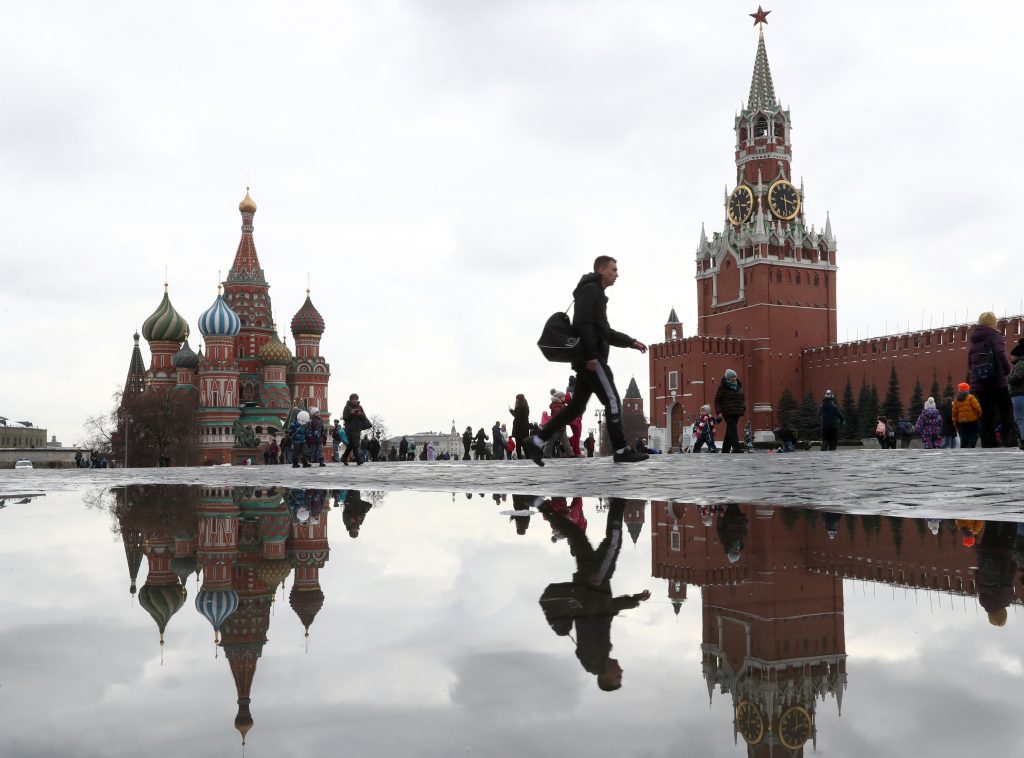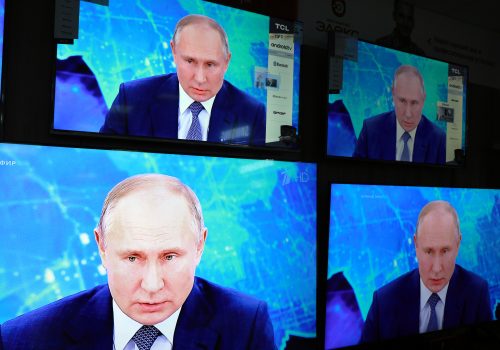When the Russian government sent an FSB hit squad to kill opposition leader Alexei Navalny with one of the Novichok nerve agents, it violated international law. The Russian government faced no domestic accountability for this lawlessness. However, there has been a degree of accountability on the international level. The EU and the United States government cited Russia’s breach of its international commitments when imposing sanctions in response to the poisoning.
This dramatic incident showcased an important truth that must be foundational to any successful foreign policy toward Russia: Russia’s domestic politics and its foreign policy are inextricably linked. Thus, even a purely pragmatic US policy conscious of this fact will treat a human rights agenda focused on holding the Russian government accountable for its abuses as a valuable means of pursuing other US interests in the relationship.
In their analysis of the Biden’s administration’s earliest steps on Russia policy, my Atlantic Council colleagues Emma Ashford and Mathew Burrows make the opposite case. They argue that the US should set aside concerns about Russia’s current model of domestic government in order to improve the prospects for constructive engagement with Russia on issues of “strategic stability” such as nuclear arms control.
This argument rests on several false premises. Perhaps foremost among these is the idea that the nature of Russia’s domestic government has minimal impact on Russia’s foreign policy. The argument also relies on the incorrect assumption that the pursuit of a pro-human rights agenda is inherently in tension with other US interests, and implies that measures designed to advance human rights and democracy abroad are ultimately futile, and thus do not merit any trade-offs they might entail on other priorities.
A closer examination of each of these premises reveals human rights issues to be not peripheral to or unfortunate distractions from more important strategic issues, but rather that a coherent Russia policy must include a human rights agenda as a central component.
Stay updated
As the world watches the Russian invasion of Ukraine unfold, UkraineAlert delivers the best Atlantic Council expert insight and analysis on Ukraine twice a week directly to your inbox.
Ashford and Burrows’ idea of a Russian foreign policy somehow divorced from domestic politics leads to an account of US-Russia relations that severely understates the role of domestic political concerns in Russia at key moments.
They note that “US-Russia relations declined markedly in 2011-12 after then-Secretary of State Hillary Clinton voiced support for protests in Moscow,” but ignore key context around those events. The Russian protestors whose rights Secretary Clinton spoke out for were in the streets of Moscow (and cities across the country) because of Vladimir Putin’s decision to return for a third term as Russia’s president and the widespread, blatant electoral fraud in the parliamentary elections shortly following that announcement. Putin’s return to the presidency and his regime’s plainly corrupt methods of securing his hold on power were the underlying cause not only of the protests, but also for the subsequent decline in US-Russia relations. Clinton’s statement (and Putin’s wild conspiratorial response accusing Clinton of organizing the protests) were merely symptoms of the damage to the relationship done by Putin’s return.
This account of the US-Russia relationship ignores other cases in which Russia’s domestic politics have contributed to foreign policy decisions that severely damaged US-Russia relations. Perhaps the most glaring example is the 2014 invasion of Ukraine, which incurred a harsh international response to Russia’s illegal annexation of Crimea and ongoing semi-covert participation in and support for a separatist movement controlling parts of eastern Ukraine. This dramatic violation of international norms and laws served an important purpose in Russia’s domestic politics, providing material for the Russian government’s messaging to domestic audiences, which sought to convince Russians that the inevitable result of a popular reform movement like Ukraine’s Euromaidan was not dignity and democracy, but violence and chaos.
Other Russian government practices, such as kleptocracy (where large-scale domestic corruption in Russia enables the pursuit of illicit sources of influence internationally) and disinformation (where tools like hacking and leaking as well as the use of paid trolls to poison online discourse were developed for use against the government’s domestic enemies before being deployed abroad) also connect the domestic and international spheres. These very practices were central to the Russian government’s attempts to influence the US presidential election in 2016, which, along with the annexation of Crimea, comprise the two biggest causes of the decline in US-Russia relations in recent years.
By ignoring the actual diversity of views among the Russian public on foreign policy and more, they create false justifications for the fatalism through which they see the pursuit of a human rights agenda.
Ashford and Burrows’ article begins with the claim that the Biden administration’s sanctions over Navalny’s poisoning highlight “the tension between Washington’s desire to promote human rights and US strategic interests,” but provides no concrete examples of such interests where progress might be derailed. The authors write that “nuclear and strategic stability talks to shore up arms control or effectively deter Russian interference in US elections are more important than imposing largely symbolic sanctions because of human rights abuses.”
The idea that sanctions for human rights abuses would interfere with cooperation on arms control does not sit easily with recent events. Progress on the renewal of the New START treaty, a crucial measure for maintaining momentum in US-Russia arms control efforts, was non-existent under the Trump administration (which, as Ashford and Burrows note, was at best indifferent to human rights in Russia). In contrast, the Biden administration renewed the treaty on February 3, two weeks after Biden’s inauguration and one day after Secretary of State Blinken condemned the harsh prison sentence handed down to Navalny on false criminal charges and called for the opposition leader’s release; that is, at a moment when Russia would have been anticipating that severe new sanctions would be imminent. On the other area specified where potential strategic cooperation could be derailed by a too-strident human rights agenda—namely, deterrence against Russian election interference—it is difficult to imagine what agreement could be reached with the current Russian government that would realistically constrain potential future action.
The rubric of “tension” between human rights and strategic interests creates problems in other parts of the argument as well. The US campaign against the construction of Russia’s Nord Stream 2 pipeline, and the resulting stress on US-German relations, is portrayed as an issue where an unwisely firm attachment to human rights issues is causing more trouble than it’s worth. But a full view of the debate over the Nord Stream 2 project includes a broader range of policy concerns at play, including such “strategic” concerns as diversifying supply in the European natural gas market and fostering cooperation on energy transition and innovation, which have little to do with human rights. These examples show that a human rights agenda can at times be either complementary (Nord Stream 2) or irrelevant (New START) to other important foreign policy priorities, and that contra-Ashford and Burrows, there is no inherent tension wherein standing up for human rights requires sacrifices on other major issues.
As part of their argument for the Biden administration to give less priority in its Russia policy to human rights, Ashford and Burrows make both implicit and explicit arguments that efforts to hold the Russian government to account for human rights abuses or other violations of international law are ultimately futile. Some of these arguments criticize human rights measures for failing to achieve things which no one ever expected. It is true, as the authors write, that “despite these measures, the regime has murdered journalists and activists and cracked down on civil society.” But no sanctions have ever been implemented with the expectation that they would bring such abuses to a total end. Furthermore, those journalists, activists, and others facing the receiving end of that crackdown (including Navalny himself) are largely united in support of the international sanctions that they see as uniquely effective in holding their government accountable for its abuses.
The authors completely ignore Navalny’s highly public pro-sanctions stance in what is perhaps the most regrettable part of their piece, which badly mischaracterizes the Russian opposition leader’s positions. As part of their case for the futility of a pro-democracy policy, they argue that “democratization in Russia would not necessarily be good for US foreign policy,” giving as evidence the false claim that Navalny “is an open nationalist who is widely known to agree with Putin on many foreign policy questions; he backed the Russian seizure of Crimea and has made racist and Islamophobic remarks.” In fact, Navalny has said that “Crimea was seized with egregious violations of all international regulations,” and publicly supported international sanctions against Russian officials in response.
It is not clear what other issues the authors might have in mind among the “many foreign policy questions” on which they claim Navalny and Putin agree. Navalny’s foreign policy positions aren’t a major part of his program and are therefore relatively undeveloped, but he has nevertheless advanced a thorough critique of Putin’s foreign policy centered on Navalny’s opposition to Russian military adventurism (including recent interventions in Ukraine and Syria) and his belief in the importance of international law and institutions. Moreover, as demonstrated in a recent scandal centered around Amnesty International, the question of Navalny’s nationalism is both highly politicized as well as highly nuanced, but even those critical of Navalny’s nationalism should realize that his ideology on that issue is in opposition to rather than in agreement with the position of the Putin regime.
The authors’ mistaken conflation of Navalny’s policy views with Putin’s is symptomatic of a fundamental problem with their article: by ignoring the actual diversity of views among the Russian public on foreign policy and more, they create false justifications for the fatalism through which they see the pursuit of a human rights agenda.
In summing up their key takeaways for policymakers, the authors write, “the US-Russian relationship has too long been predicated on the fantasy that Russia could be reshaped, whether through aid or coercion, into a Western, liberal democracy. However, there is little prospect of transformation or of ending human rights abuses.” It is one thing to point to the very real limits on what US human rights and democracy efforts toward Russia can achieve, but to describe the idea of a potential democratic Russia as a “fantasy” is to suggest that the Russian people are uninterested in or incapable of building a democratic society.
This fatalism is unwarranted. As my friend Vladimir Kara-Murza never tires of pointing out, on those sadly rare historical occasions when Russians have been able to vote in real elections, they have consistently supported candidates with democratic values. According to recent Levada Center research, 78% of Russians believe their country’s relationship with the West should be that of “partners” or “friends,” and younger Russians in particular are significantly less satisfied than their elders with the country’s political system in general and with Putin in particular. The Putin regime has made its choice to ignore those aspirations and the Russians who hold them; for the United States government to do the same would create a poor foundation for strengthening the US-Russia relationship in the long term.
Dylan Myles-Primakoff is director of Business Development for the NewNode Project at Clostra, Inc. and a nonresident senior fellow at the Atlantic Council. From 2013-2020, he worked on the Russia and Eurasia programs at the National Endowment for Democracy.
Further reading
The views expressed in UkraineAlert are solely those of the authors and do not necessarily reflect the views of the Atlantic Council, its staff, or its supporters.

The Eurasia Center’s mission is to enhance transatlantic cooperation in promoting stability, democratic values and prosperity in Eurasia, from Eastern Europe and Turkey in the West to the Caucasus, Russia and Central Asia in the East.
Follow us on social media
and support our work
Image: People walking on Moscow's Red Square. February 28, 2021. (Sergei Karpukhin/TASS via REUTERS)




